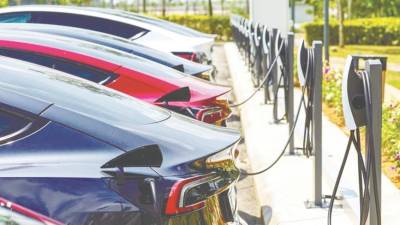
PETALING JAYA: Despite their dominance in the domestic motor vehicle market, Proton Holdings Bhd and Perusahaan Otomobil Kedua Sdn Bhd (Perodua) will likely face increasing pressure in transitioning to electric vehicles.
Industry observers believe this is due to Chinese EV manufacturers’ rapid expansion in Malaysia, intensifying competition, reshaping market dynamics, influencing investment trends and driving shifts in supply chain strategies.
Malaysia University of Science and Technology Prof Emeritus Dr Barjoyai Bardai pointed out that Proton and Perodua account for nearly two-thirds of total industry volume.
He said Proton’s partnership with China’s Zhejiang Geely Holding Group offers a competitive edge, but more affordable EV models are needed to capture a larger market share.
“Malaysia’s high EV import taxes and lack of charging infrastructure remain major barriers to widespread adoption.
“Chinese EVs can cost as little as a few thousand ringgit, making affordability a potential game-changer if pricing strategies adjust,” he told SunBiz.
Leading Chinese brands such as BYD are capturing nearly 40% of Malaysia’s EV market, and local and global automakers are facing mounting pressure to adapt.
According to industry data, BYD leads Malaysia’s EV market with a 39.33% share, followed by the US’s Tesla at 23.58% and Germany’s BMW at 9.06%.
Other notable players include Great Wall Motor, Chery and Smart, reflecting China’s growing influence in the sector.
Bank Muamalat Malaysia Bhd chief economist Dr Mohd Afzanizam Abdul Rashid also highlighted the significant market dominance of Chinese EV brands.
“It not only intensifies competition but could also spur innovation and collaboration among local players.
“Pricing remains the key differentiator, but factors like charging infrastructure, maintenance and resale markets will shape long-term success,” he said.
Malaysia Automotive Robotics & IoT Institute (MARii) said the entry of Chinese EV manufacturers into the Malaysian market is a strategic opportunity rather than a threat.
MARii emphasised that the increasing presence of Chinese brands is accelerating the adoption of EVs in the country, driving innovation and setting higher standards for technology, pricing and consumer experiences.
“This challenges local players to enhance their capabilities to become a regional hub for next-generation vehicles.
“By spurring existing local automakers to invest more in research and development and for strategic alliances, Chinese competition fosters greater technological advancement and industry-wide growth, benefiting the entire Malaysian automotive ecosystem,” a MARii spokesperson said.
On another note, traditional auto part suppliers face an urgent need to upgrade capabilities or risk being phased out, as EVs require fewer moving parts than conventional internal combustion engine vehicles.
The increasing presence of global automakers establishing direct operations in Malaysia is also reshaping the industry.
Companies such as Stellantis, Chery, Great Wall Motor and Shanghai Automotive Industry Corporation are bypassing traditional distributors, intensifying competition in the downstream automotive supply chain.
Maybank Investment Bank Bhd (Maybank IB) expects the increasing presence of global automakers also to put pressure on local distributors and parts suppliers, leading to industry consolidation.
“Technical partnerships and upskilling will be crucial for Malaysian firms looking to remain competitive,” Maybank IB said in a research note.
As the competition intensifies, the bank-backed research firm said, Proton and Perodua will have to address several technological and strategic gaps to solidify their positions in the EV market.
MARii proposed that co-developing battery technology and e-motors on a shared platform would be a strategic move.
“This collaboration would reduce production costs, enhance efficiency and accelerate innovation while ensuring scalability across different models.
“By leveraging shared R&D and local manufacturing, both companies can offer more competitive and high-performance EVs, driving wider adoption in Malaysia’s growing EV market,” the MARii spokesperson said.
Industry observers agree that the rapid rise of Chinese EV manufacturers is forcing a transformation across Malaysia’s automotive industry. While it presents challenges to local automakers and suppliers, it also opens doors for innovation, strategic partnerships and supply chain development.
Source: The Sun Daily
A word from our sponsor:
Need Help With Your Personal Finance / Money Issue or need a coach to help you structure or just want to learn the financial skill to self manage your financial matters and retirement. iLearnFromCloud.com
Need to solve a problem quickly, now you can solve it by learning the art of problem solving Art Of Problem Solving
Feeling hungry. Latest food news from Best Restaurant To Eat Malaysian Food and Travel Blog
Memory loss. Need to organize better. Solve problem fast with Free Mind Mapping Software Mind Mapping 101
Need A Customized System Development for your business or Going Paperless XPERT TECHNOLOGIES - Empowering The Paperless Economy

No comments:
Post a Comment